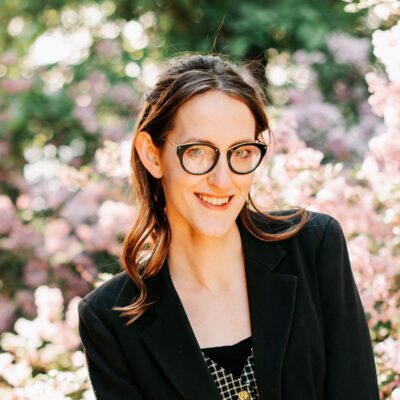Student Spotlight: Kelly Richmond

April 22, 2024
Kelly Richmond is a doctoral candidate in performing and media arts from Toronto, Ontario, Canada. She earned her B.A. in English drama and theatre and psychology at McGill University and now studies the role of live performance in responding to the climate crisis under the guidance of Sara Warner at Cornell.
What is your area of research and why is it important?
My research considers the role of theatre and live performance in responding to the climate crisis. I look at how examples of queer, feminist, and Indigenous contemporary performance portray environmental and ecological issues, and how they effectively harness the medium of live performance to do so. Of particular interest to me is how theatre can help us re-imagine and re-present relationships between humans and non-human nature through co-presence with un/natural in/humans.
What are the larger implications of this research?
The problem of the climate crisis is no longer a problem of technology or policy; it is a problem of implementation. We have the renewable energy technologies developed; we have Green New Deal policies to decarbonize the economy drafted. What we don’t have is sufficient public refusal to continue current patterns of consumption, or mass enthusiasm for the vibrant connections that emerge when we turn towards circular sustainable community. What we need now is a cultural shift, a storytelling shift, one in which the climate crisis is imagined not dystopian apocalypse but a once-in-an-epoch opportunity to renew, restore(y), and repair. As a unique hub of localized ritual, gathering, and storytelling, theatre has a key role to play in this shift.
What does it mean to you to be a Bouchet Scholar? How do you exemplify the five pillars of the Bouchet Society—character, leadership, advocacy, scholarship, and service?
What I appreciate most about the Bouchet Society values is that they remind us that the role of the scholar is not limited to research and teaching within the confines of the academy; as scholars we exist within a greater cultural and intellectual ecosystem with which we must be response-able and care-full. For me, this has meant uniting my teaching, research, and artistry around community-based events that involve participants in environmental actions. The Ithaca Department of Arts and Futures (2023), a day-long performance action which brought together artists, agricultural workers, sustainability specialists, and students to envision a climate-resilient future in Tompkins County; Haunted Natures Hidden Environments (2022), an immersive-environmental performance which brought together four PMA courses and over 90 artists to create a walk-through installation devised from queer, feminist, and Indigenous environmentalist plays; and eTRASH (2020), a six-week workshop series on devised theatre methods and their application for environmental activism. Each of these projects was designed to remove barriers to access; for example, no prior performance or environmentalist experience was required to participate, course credit or monetary honorariums were offered as compensation for labor, and food was provided at each meeting. I understand that taking care of my collaborators is a prerequisite to ensure that no one is barred from participating in my projects.
President Pollack has designated this academic year’s theme as freedom of expression. What does freedom of expression mean to you?
Freedom of expression requires freedom to physically/visually/aurally/temporally disrupt the public sphere. Freedom of expression requires freedom to become an inconvenience to systems of power and to business as usual. Freedom of expression requires freedom to create theatrical protest movements and experiment with new ways of being in public together. Freedom of expression on campus requires being allowed to make such experimentations a part of course work and extracurricular culture without fear of retribution from campus authorities or administrative policies.
What are your hobbies or interests outside of your research or scholarship?
I volunteer with Brown Coat Cat Rescue where my partner and I specialize in bottle-feeding orphaned neo-natal kittens and caring for other special needs rescues; over the past 24 months we’ve successfully fostered 50 cats, all of whom are now vaccinated, spayed/neutered, and adopted. I take classes at Circus Culture where I’m training in lyra and handstands and I am a part of a wonderful fitness community at CrossFit Vertical. I also love baking, vegetarian cooking, hiking, and camping.
Why did you choose Cornell to pursue your degree?
I wanted to work with my incredible supervisor Prof. Sara Warner. Reading her book “Acts of Gaiety” during my undergraduate studies was transformative for my little lesbian life.
